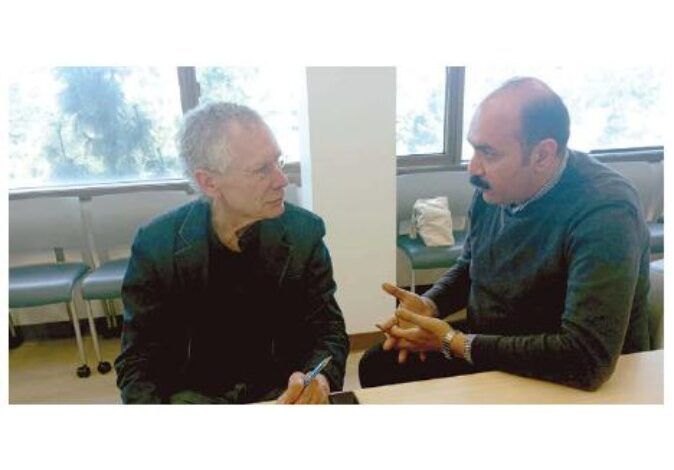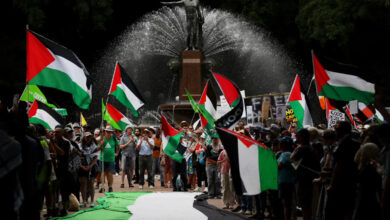
As the world undergoes rapid political and economic transformations with escalating conflicts shaking the Middle East, the region has witnessed over a full year of genocide in Gaza – and no clear prospect for an end.
The conflict has expanded to southern Lebanon, reverberated in Yemen and Iraq, and reached Iran.
The Future of the Middle East series seeks to explore these challenges through interviewing prominent politicians, theorists, intellectuals, and current and former diplomats, providing various regional and international perspectives.
Through these discussions and insights, lessons from the past are shared in order to chart a path forward.
From the roots of the Arab-Israeli conflict to regional interventions and the rise of new non-state actors, this series engages in enlightened discussions regarding what can be learned from history and how it will impact the region’s future.
It aims to explore visions for the future and highlight the vital role that Arab nations can play if historical alliances are revived, pushing towards sustainable stability while safeguarding their interests.
The structure of the series involves two parts – the first being a series of seven fixed questions based on requests from readers on the future of the region. The second part features questions tailored to the interviewees specific background, providing new insights into the overarching vision of the interview.
Ultimately, this series aims to explore how the Arab region can craft its own unified independent project – one free of external influence.
A Professor of modern Middle Eastern history at the University of California, James Gelvin, emphasized that the centrality of the Middle East makes it a flashpoint for conflict and external powers, alongside its abundant oil wealth.
In this exclusive interview with Al-Masry Al-Youm, he noted that ending the conflict in the Middle East requires on two-state solution, and how Trump might leave Israel to fend for itself.
Gilvin, who holds a PhD from Harvard University and has taught there and at the Massachusetts Institute of Technology, as well as at the American University of Beirut, is the author of five books, including The New Middle East, The Arab Uprisings, and The Israeli-Palestinian Conflict.
In his interview, he emphasized that Egypt has a key role in mediating between Hamas and Israel and has every right to oppose the displacement of Palestinians.
■ The term “Middle East” is a colonial geographical expression. However, it has become the prevailing term to talk about the region that includes the Arab countries, Iran, Turkey, and other countries. Throughout history, the region has suffered from conflicts on various backgrounds, rooted in colonial schemes until it became a permanent flashpoint on the world map. In your opinion, how do you view the reality of the region and the impact of history?
The British originally used the term Middle East as a geographical term referring to the areas on the route to India from Britain. During the 19th century there were two such routes, one via the Suez Canal to the Red Sea, and the other via the Euphrates River to the Persian Gulf.
Thus, the Middle East originally referred to Egypt, the Levant, and Mesopotamia.
In the early 20th century, it came to include those lands in Asia Minor and southwest Asia surrounding those regions, along with Egypt. The reason this is important is that it shows the close relationship between geographical knowledge and imperialism, a connection which prevails to this day.
Perhaps one of the main reasons the Middle East has become a hotspot for conflict is its centrality to the concerns of outside powers. Whether those powers are the US, Britain, France, or Russia, its location between Europe and the Far East, its borders with the Soviet Union (now Russia), and its abundance of oil, have made it a target for major powers and an area of competition and conflict between those powers and their regional agents.
■ The term “Middle East” emerged in the writings of American Alfred Mahan in 1902, before Condoleezza Rice spoke of the “New Middle East.” This term is being widely echoed today in light of the Israeli war on Gaza and Lebanon and the conflict with Iran. How do you view this plan, especially after Trump’s victory and the rise of right-wing forces in the United States?
From 1945 to 1991, the US’ main interests in the region were to contain the Soviet Union, maintain the regional balance of power among stable states, guard the West’s access to oil and sea routes and lines of communication, and support Israel for strategic, political and ideological reasons. In the words of President Anwar Sadat in the 1970s, America held 99 percent of the cards in the region.
With the collapse of the Soviet Union, American goals and policy changed.
Both “neoconservatives” like Dick Cheney and “liberal internationalists” like Hillary Clinton wanted to maintain America’s dominant position in the region and promote “American values,” although they differed on how to achieve these things.
Obama wanted to change the direction of American policy and spoke of reducing American commitments in the region so that the US could “pivot” to East Asia, he saw the region as the most important area for economic and political competition in the future.
Due to the ongoing war on terror, the Israeli-Palestinian conflict, and the 2010-2011 uprisings in the Arab world, he was unable to do so.
Although Donald Trump claims to be “America First,” he does not have a coherent policy.
In his first term, his actions were motivated purely by whim. For example, when he got angry during a phone call with Turkish President Erdogan, he told the Turkish president, “Okay, you can have Syria.” He began the withdrawal of American forces there, and the political gains.
He surrendered to every Israeli desire so that he could obtain the votes of those who support Tel Aviv for a second term.
Finally, he seeks revenge on his political opponents, which is why he withdrew from the nuclear agreement with Iran, because it was negotiated by the Obama administration. Biden had not differed much from Trump’s policy toward Israel, so Trump cannot focus on reversing his direction.
Since Trump is constitutionally unable to run for president again, he may be more focused on his legacy than on political gains, so Trump boasts about American weapons and anti-Iran policies, but at the same time, his “America First” philosophy may leave Israel to fend for itself.
■ In your opinion, what are the major regional powers doing about these schemes, specifically Egypt and Saudi Arabia, as the two major powers in the region?
Most world leaders already know how to deal with Trump, and despite nearly three months of his presidency, his unpredictability continues to hinder America’s foreign relations. The reason the Saudis pursued a diplomatic approach with the Iranians was that they knew they couldn’t rely on Trump while simultaneously negotiating a comprehensive defense treaty with the Americans.
On the other hand, Egypt undoubtedly has a historic role in mediating between Hamas and Israel and has a peace agreement with Tel Aviv, especially given Israel’s efforts to push toward Egypt for displacement, a move Cairo rightly rejects.
There is no unified Arab plan to address the plans for the region, particularly the Israeli expansionist objectives that have become clear in Gaza, Lebanon, and Syria. Talk of any intention to annex additional territories on the Arab map is the approach Trump put forth when he spoke of a “small Israel” that must expand.
How can the Arabs formulate their plans in response? In 2002, Saudi Arabia proposed an Arab-Israeli and Israeli-Palestinian peace plan called the “Arab Peace Initiative.” Among other things, the plan called for complete Israeli withdrawal from all territories occupied in 1967 and the establishment of a Palestinian state in the West Bank and Gaza Strip with East Jerusalem as its capital.
If the Israelis accepted the proposal, the Arab League members would end their hostility to Israel and establish normal relations under a comprehensive peace framework. As the Saudis likely expected, the Israeli government rejected this initiative.
For decades, Arab governments, along with a number of policy analysts and presidents, promoted the idea that instability in the Middle East is “linked” to the failure to resolve the Israeli-Palestinian conflict.
■ Throughout history, Egypt has played key roles in the region. How can it fulfill these despite the challenges facing it?
Egypt certainly plays a historic and pivotal role in the region, one that is indispensable.
It is constantly fulfilling its role, whether in its attempts to achieve peace and end the war on the Gaza Strip, or its stance on the ceasefire in Lebanon.
Therefore, Cairo continues its duty as it has in the past and will continue to do so.
Especially since Egypt has the potential to do what it can, and Cairo has always been a center of balance in regional and international relations.
■ How can the Arab region benefit from the tensions between major powers and the discourse of global multipolarity? How can it play a role to its advantage in this international competition, so that its resources are not in the hands of a single power that has harmed it and depleted its resources for decades?
The US has most likely lost its dominant position in the Middle East forever, and policy analysts and historians will continue to debate whether that loss was inevitable, the result of accidental factors, or the failures of one leader or another (George W. Bush? Barack Obama?).
But in the end, it is worth remembering the unique set of circumstances that allowed and forced Washington to assume the role of the dominant power in the Middle East. In this period of American hegemony in the Middle East, the world order was bipolar, and the competition for dominance over the region was a zero-sum game, where the victory of one side meant the loss of the other side.
The Middle East was a zero-sum game – a prize worth competing for.
The US had been unrivaled as an economic and, arguably, military power, and has held a prominent position within the global economic order. As Russia emerges as a multipolar player, so too does China’s position, especially in light of the Belt and Road Initiative.
This initiative will connect China’s prosperous coast with its less prosperous western and southwestern regions, via land and sea routes.
With South and Southeast Asia, Central Asia, the Middle East, Europe, and Latin America, 20 Middle Eastern countries have either signed up to the initiative or expressed their approval of it.
However, the Chinese are not oblivious to US experience in the region. Moreover, their interests (oil, shipping lanes) could be best served if they did not have to choose a side among regional rivals.
Especially since China’s top three oil suppliers are, in order, Saudi Arabia, Iraq, and Iran.
There is no reason for China to assume the responsibilities of a hegemonic power when it can benefit from existing security networks and a functioning global economic system supported by others, as it did in the past.
Ironically, China’s role in the contemporary Middle East resembles the role the US played in the region during the interwar period.
So, for those asking “Will China replace the United States as the dominant power in the Middle East?” the answer is, “Why should it?”.
Chinese officials have said that the future of the Middle East will be multipolar, with no single hegemon.
■ If you were to paint a picture of the future of this region in light of the current conflicts and threats surrounding it, how would you describe it in detail?
Certainly, the most important thing is to accept the peace process in the region and to acknowledge the principle of the two-state solution as the only way, and Israel must know well that any military solution to the Israeli-Palestinian conflict is an “illusion”.
The only solution is political, through the establishment of a Palestinian state.
As for the ongoing Gaza war, the Israeli generals are well aware of the painful truth for them: they are unable to destroy Hamas, which is woven into the fabric of Gaza society – for example, it is the largest employer and provider of welfare.
The best the Israelis can achieve is to weaken Hamas, declare victory, and withdraw.
They will still have to maintain control over the Netzarim crossings and intervene militarily when they deem it necessary.
■ How do you view developments in the Gaza Strip and Lebanon following the assassination of Hassan Nasrallah, Yahya Sinwar, and the leaders of Hamas and Hezbollah?
The Netanyahu government and Hamas are fighting two different wars, each with its own story.
For Hamas, the Gaza war is part of the Palestinian national liberation campaign. For Netanyahu, who denies the Palestinian right to self-determination, it is a campaign to weaken Iran and its proxies in the region and one that refuses to recognize the Palestinians as independent actors.
We do not know for sure why Hamas launched the “Operation Al-Aqsa Flood” on October 7, 2023.
But it certainly wasn’t because Iran asked it to or agreed to it. Iran doesn’t have much control over many of its proxies—not Hamas, not Hezbollah, not the former Syrian government of Bashar al-Assad. These proxies act according to their own logic and capabilities, and they often surprise Iran with their actions, as evidenced by its lack of knowledge of the timing of the “Al-Aqsa Flood.” As an American politician once said, “All politics is local.”
According to US intelligence, Iran was unaware that Hamas was planning the October 7 operation.
Hamas dealt Israel a military and psychological blow, something the Palestine Liberation Organization (PLO) was unable to do. It is also negotiating the release of hostages on an equal footing with Israel, strengthening its position. Hamas has proven more effective in achieving Palestinian goals than the PLO.
In other words, Hamas has already achieved its military objectives, albeit at a high price.
Israeli Prime Minister Benjamin Netanyahu has stated that Israel seeks to achieve two goals: destroying Hamas and releasing the hostages it has held. However, there is also a third goal: to maintain his position in power, as he faces corruption charges.
For the Israeli government, releasing the hostages appears to be an afterthought imposed on it by the Israeli public. When it comes to the hostages, the government doesn’t speak with one voice, and it doesn’t seem all that committed to the project.
That’s why the Netanyahu government is expanding the war to Lebanon, Syria, Yemen, and Iran itself.
Previous Israeli governments have regularly followed a policy of “mowing the lawn.” Hamas or Hezbollah might carry out some provocative action, such as launching a barrage of rockets at Israel. Israel would then respond, and the following year, the same thing would happen.
■ In your opinion, will the role of the resistance decline? Was the fall of the Assad regime expected? Why did the collapse occur so quickly?
Netanyahu is seeking a strategic victory, not a tactical one. He wants to prolong the conflict and grant Israel victory over Iran, not just over the Palestinians. This will make Israelis forget his lack of preparation for the events of October 7 and keep his coalition in power. Members of this coalition threatened to bring down the government if Hamas was not destroyed. As I said, if the government collapsed, Netanyahu would go to prison -hence the ever-increasing war.
With the decline of the Iranian “axis of resistance,” Tehran lost its deterrent capacity against Israel.
The only outcome of the war so far has been the ouster of Bashar al-Assad in Syria. Hayat Tahrir al-Sham exploited the weakness and disunity of the Syrian regime’s allies and the weakness of the Syrian army after 13 years of war to launch a swift, lightning campaign.
Russia was distracted by Ukraine, and Iran was weakened by years of sanctions and spending on military adventures.
■ How do you see the future of Syria?
Judging the current experience of the “Sharia” government is difficult.
If they truly want stability, they must avoid three things: retaliating against other Syrians and Syrian communities, such as the Alawites; imposing Islamic norms such as the hijab and gender segregation on a population that includes large numbers of minorities and secular Syrians; and over-centralizing a society over which they have no real control.
There are vast areas in Syria—the north, east, south, and coast—that enjoy autonomy, or de facto autonomy.
We don’t know what will happen to Damascus in the future. Will Syria become like Afghanistan under Taliban rule? Or will it undergo the same experience as Libya? The latter outcome is the most likely, but nothing is certain.




